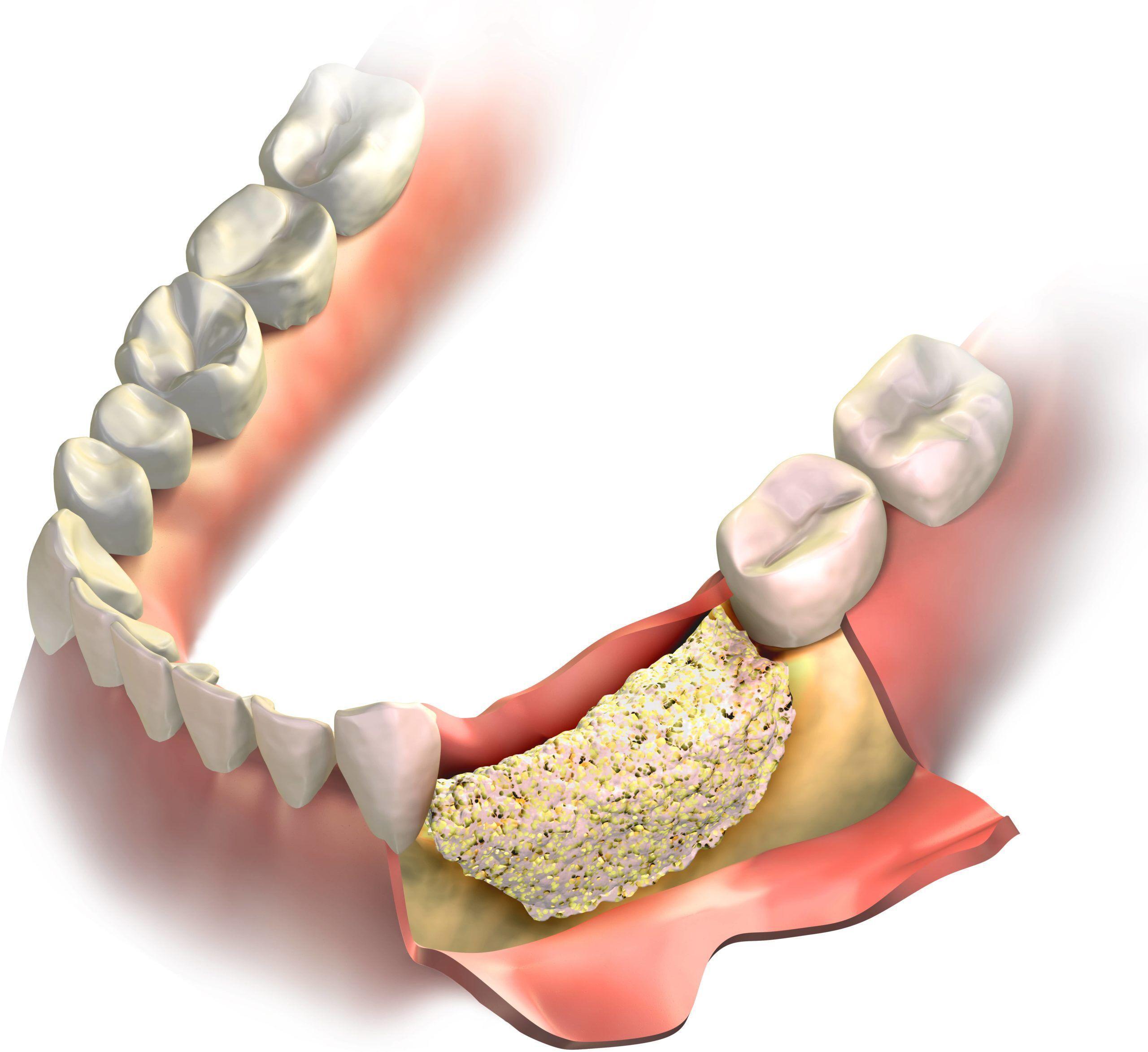Bone Grafting
Your oral health can play a significant role in your comfort and satisfaction with your appearance. It can also affect your daily quality of life. Tooth loss is sometimes inevitable but, left untreated, even more damage can be caused to your jaw bone, dental function and facial appearance as a result. However, the consequences of tooth loss, while sometimes severe, can be treated, minimized and reversed, in many cases.
A bone graft can help you naturally regain lost bone, which is the result of tooth loss. With restored jaw bone mass, you can also qualify for dental implants which can further improve your smile. The first step is having a consultation with a qualified and experienced oral and maxillofacial surgeon, such as Dr. John P. Freeman. After your diagnosis, you can enjoy a safe, effective treatment, which is tailored specifically to your needs and offers attractive and lasting results.
A bone graft procedure can seem daunting, but when expertly performed by a highly-trained and skilled surgeon, you can enjoy the utmost safety with a very comfortable recovery. Most importantly, you can get your smile back. Here are a few things to consider if you are dealing with the consequences of tooth loss and considering a bone graft.
Why does bone loss occur?
Bone degeneration in the jaw is a natural result of tooth loss. The gentle, daily pressure exerted on your jaw bone by your teeth, while chewing, stimulates the bone of the jaw and spurs new bone growth. When you lose a tooth, this routine, healthy pressure is lost and, as a result, new bone fails to regenerate. Depending on the extent of your tooth loss, bone degeneration can occur rapidly and become extensive, affecting the health of adjacent teeth and eventually the entire jawline. As much as 25 percent of jaw bone width can be lost in a single year if this condition is not addressed by a competent oral and maxillofacial surgeon.
Significant tooth loss not only may affect your comfort and ability eating but also change your facial appearance. The lower jaw (mandible) can shorten and the upper jaw (maxilla) can sink inward, especially when the front teeth are lost and the lips lose their support. As a result, you may develop a hollow facial appearance, which can become a major concern. While these types of changes typically occur gradually, they will continue to progress without treatment. Also, bone loss in the jaw can negatively impact your gum health, as well, leading to loss of gum tissue, and additional oral health problems.
Can bone loss be stopped and/or reversed?

The process of bone loss is not inevitable. Patients facing this issue can stop bone loss and begin to grow new bone through bone grafts. Bone grafts are introduced at the site of lost teeth, replacing bone already lost and encouraging bone regeneration.
Bone grafts give patients the best results when they are placed by a qualified oral and maxillofacial surgeon immediately after a tooth is lost since they can prevent sustained bone loss from occurring. However, you can still enjoy improvements to your jawline if bone grafts are introduced later. Bone grafts are also an essential prerequisite to dental implants later.

How is a bone graft performed?
In order to have a bone graft, bone material must first be sourced to perform your procedure. Bone may come from either of the following:
- A donor site in your own body (for example, from your maxilla, mandible or iliac crest)
- Someone willing to donate bone material
- An animal
- Synthetic material
The material chosen for your graft will be selected by your oral and maxillofacial surgeon, Dr. John P. Freeman, based on what will give you the best results, based on his experience. Graft material is always thoroughly disinfected before use for your safety.
Bone grafts benefit the jaw by providing healthy bone upon which new bone will grow. Over time, new bone growth will naturally replace your graft material. Depending on the extent of your bone loss, Dr. Freeman may choose to supplement your bone graft with natural collagen membranes or artificial materials to help guide your bone growth effectively and promote graft healing. Your body will eventually absorb these supplemental materials, so removal at a later stage is never necessary.
Bone Grafts Are Highly-specialized Procedures Which Are Adapted to Your Needs
Bone grafts are not a one-size-fits-all procedure. Your treatment will be explicitly and painstaking tailored to your needs. Dr. Freeman will consider many factors when determining the best treatment approach for your unique concerns.
Different scenarios will call for specialized forms of treatment. For example, if you are having a tooth extracted, you will likely get the best results from a simultaneous bone graft, which will prevent any bone loss from occurring in the first instance. Alternately, if a significant amount of time has passed, you may require a surgery which opens the gum and implants grafting material and supplemental materials, to make implants possible later. Cases involving the rear, upper jaw may require surgery that accesses the adjacent sinus cavity through the cheek wall. In every instance, your results — and, above all, your safety — will take priority. Your comprehensive treatment plan will be based upon a thorough in-person consultation, performed by Dr. Freeman.
THE SURGEON WILL BASE HIS RECOMMENDATION ON SEVERAL VITAL POINTS, WHICH WILL OFTEN INCLUDE:
- Where bone loss has occurred
- How much bone loss has occurred
- How the tooth or teeth were lost — for example, was it due to an injury or extraction?
- How much time has passed since the tooth loss has occurred
What is recovery like after a bone graft?
Recovering from a bone graft is a relatively comfortable process for most individuals. You will experience some mild discomfort initially, which can last for a few days. However, you can effectively manage pain and swelling, initially with narcotics, during the first few days, as well as with over-the-counter medications, such as ibuprofen, later. Dr. Freeman will also prescribe you antibiotics, as a precaution. While all surgeries have risks, a bone graft performed by a qualified oral and maxillofacial surgeon, like Dr. Freeman, is an extremely safe procedure. Nonetheless, Dr. Freeman will be available throughout your recovery to answer any questions you may have or address any concerns which arise.
Bone Grafts Increase Your Oral Health and Expand Your Dental Implant Options
The health of your jaw bone is crucial to your overall health since it contributes to your oral health, including your teeth and gums, and also your appearance. A healthy jaw bone also increases the number of dental implants that you may select from if you seek further treatment. Dental implants provide an effective and reliable way to restore your dental function and appearance. These long-lasting and safe devices can be very attractive, with a wide range of natural-looking options available. Implants are also very versatile, allowing you to pair them with a broad range of additional dental restoration procedures if you desire.
Healthy bone mass in the jaw is a requirement for virtually all dental implants, ensuring that the implant will be adequately secured in place and that the final result is both functional and attractive. With sufficient bone mass at the restoration site and an appropriate dental implant selected, you can enjoy a final outcome which will look and feel just like your natural teeth. The health of your jaw bone will also continue to improve as a result of the titanium or zirconia implant, now securely anchored into and fused with your jaw bone.
Have your bone graft performed by qualified and experienced oral and maxillofacial surgeon, Dr. John P. Freeman, for outstanding results!
Whatever the reason you need to have a bone graft, do not delay your procedure any longer than necessary. The consequences of having treatment too late can be severe, jeopardizing the health of your surrounding teeth and gums and potentially significantly affecting the appearance of your face as a whole.
You have a wealth of safe, proven and effective options to choose from that can reverse any damage which may have occurred and also encourage healthy bone growth. Further, having a healthy jaw makes a variety of dental implants possible, which can restore function and create a beautiful look.
